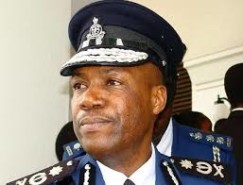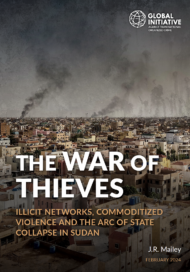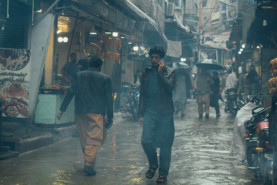Posted on 27 Feb 2014
Federal prosecutor on detail to FBI’s Cyber Task Force and founding member of the Global Initiative Against Transnational Organized Crime
It’s hard to believe that Gavin Corn, a top federal prosecutor seconded to the FBI’s cybercrime division, and at the cutting edge of many high-profile organized crime cases, studied anthropology and history and once wanted to be an archaeologist.
How then did he end up in the murky world of cybercrime, helping the FBI track down and put away perpetrators? “When I realized that there were not a lot of jobs available (in the field of archaeology) I thought it wise to find another line of work,” Corn told the Global Initiative. He could not have foreseen that the “other line of work” – as a federal prosecutor – would place him at the forefront of some of the major organized crime cases the United States government has cracked open – including the Tran Organization casino-cheating case, the Min Hui Loi heroin trafficking case, numerous Romanian cybercrime cases, and many others. And, as if his career has not thrown up enough heart-racing moments, Corn says if he had the chance again, he would have chosen to be a federal agent instead. Why? “Because it’s more exciting and close to the ground,” he says.
Corn, 45, has acquired a wide-range of experience in the field of organized crime since he joined the Criminal Division of the Department of Justice as a trial attorney in 1996: first, as an attorney in the Narcotics and Dangerous Drug Section; then in the Organized Crime and Racketeering Section; and then in the Office of Overseas Prosecutorial Development, Assistance and Training. In 2007 he moved to the Computer Crime and Intellectual Property Section, where he remains today. Last year he was seconded to the FBI’s Office of General Counsel. He also served as the Chief Counsel of the International Organized Crime Intelligence and Operations Center (IOC-2) from 2009 -13, acting as Interim Director for approximately 18 months of that time.
In an increasingly globalized criminal world, his career has taken him to Southeast Asia, the Balkans and Eurasia. Some of the cases he’s worked on have seen many convictions, including one where over 40 members of a Romanian cybercrime and money laundering network were arrested in the US and Romania. The Tran Organization bust in 2007, which dismantled a gambling syndicate that defrauded US casinos out of millions of dollars through high-tech software and a cunning shuffling trick, also resulted in scores of arrests and convictions. “It was a very difficult case to investigate, going on as long as it did. We were lucky in that the casinos have good surveillance systems but it took a lot of time to find out how they were doing it.” The easy part, he says, was gathering intelligence on the criminals. The harder part, as always, was securing enough evidence to support prosecutions and convictions.
It can be very challenging to investigate and prosecute today’s cybercriminals who hide behind proxy servers in safe havens beyond the reach of the law. The recent takedown of Silk Road provides one example. Corn can’t comment on the Silk Road investigation, but he says, “there are lots of sites operating in this way. It’s a very dangerous area right now because they are so difficult to identify. Many of them are providing services of the most heinous kind – from assassinations to child porn.”
Corn says his decision to enter the world of crime fighting was also governed by another impetus – a desire to do good: “I always want to wake up in the morning, look at myself in the mirror and know that my job is about doing what’s right by defending the public and trying to help people.”
Besides teaching a course on the “Role of the Federal Prosecutor” at several law schools, Corn, who is based in Washington, is a widower and is single-handedly raising his three young children. If he had his way, he would love to spend more time merging his interest in culture (he is fluent in Italian) with his crime-fighting skills, by investigating the booming business of art crime. Unfortunately, however, this is not high on the list of government priorities right now.
The Global Initiative asked Corn to share his views on how the Internet has changed the way organized crime operates and what new challenges this throws up for investigators and prosecutors.
1 In your many years of experience investigating organized crime, how has the modus operandi of the perpetrators changed?
When I started out we were in the realm of pagers – even cell phones weren’t really used yet. Today, the sophisticated level of technology used by organized crime groups is producing a new and very difficult set of challenges for those of us investigating these crimes. Cybercrime wasn’t even a part of organized crime and now it’s the epitome of it. Also, since the fall of the Iron Curtain there is far more networking between different crime groups. In the past, you didn’t see this kind of collaboration but today you’ll have online discussions between Nigerian fraudsters and Romanian hackers, for example.
Besides the expansion of networking among criminal groups, the rise in “anonymization” technology – systems like TOR (The Onion Router) and other proxy systems that are designed to hide the location of internet connections and even servers – has been huge. This may be good for promoting freedom of speech but it makes investigating criminal cases much harder. Also, anonymous payment systems like Bitcoin that allow for the transfer of funds without revealing the identity of the persons behind the transactions pose a big challenge for us.
2 How does the law enforcement arm respond to these challenges?
Unlike criminals, who aren’t limited in anything they do, there are rules we must follow. Criminals can use the free flow of technology to its fullest, accessing each other’s markets instantly, while we must go through restrictive legal procedures to essentially do the same thing. In some ways our reach has expanded but in some ways not. The legal changes haven’t kept up with the technological changes, especially on the international level. We often know who is responsible for various crimes, but can be very difficult to pursue investigations against many of them because the cooperation among some countries is not as fluid as the collaboration among some criminals. Issues like unfriendly governments, corruption and outdated laws, can create hurdles. In the past, criminals required a strong physical presence in a country to commit crimes, but now cybercriminals essentially can operate remotely from a “safe” country where it is far less likely that they will face consequences. Now that organized crime is so international, much of our work has to take place in foreign countries. Sometimes this can be fruitful but other times it’s really difficult and frustrating.
The expansion of organized crime groups into multinational conglomerates that take advantage of modern technology makes it extremely difficult for us to unravel these connections. In a single day, a criminal organization can easily establish a proxy server to deploy malware and illegally initiate fraudulent wire transfers from compromised bank accounts, crossing multiple borders and using multiple computer systems in the process. But it can take months for us to get hold of the records from these transactions. This really is the biggest challenge. We need to find ways to work with each other faster. In some ways we’re doing really well, in others, poorly. It’s a case-by-case thing – it depends on which countries you’re dealing with.
Also, lots of changes have taken place regarding how people are combining their resources to make money illegally. This has created technological challenges for investigators: technology experts and organized crime investigators often have different skills. We need to see how we can bridge the gap between them. We have lots of catching up to do. While many investigators lack the technical skills, the technology experts lack complex criminal investigative skills that you can’t get from reading, but must come from real world experience. We have to combine these skill sets.
3 Besides the frequent lack of co-operation between countries as you’ve mentioned, what other aspects of cross-border investigations are frustrating?
Despite the recent allegations (about US surveillance) it’s extremely difficult to conduct a wiretap under US laws. A number of stringent legal requirements must be met to obtain court authorization to intercept communications. While it could easily take two months to obtain this permission in the US, it often takes much less time and effort in other countries. But the US has other effective tools to combat organized crime, such as the ability to develop and use witnesses, that may not be so accessible in foreign countries. We almost always use members of criminal groups to testify against other defendants. As another example, it sometimes is harder for us to obtain evidence that is found in areas protected by the 4th Amendment, as getting search warrants is time consuming, but our ability to use under-cover agents is easier than in many other countries. Countries can and should work together to maximize the benefits of our different systems. In some countries, of course, where the rule of law is weak, the rules become almost irrelevant – a dictator does not need to rely on the law to achieve his ends. Each law-abiding nation, however, must balance the protection of the public’s right to privacy and the investigative needs of law enforcement. Some, I think, lean too far in one or the other direction.
4 Can you comment on the current controversy around wire-tapping of foreign government officials?
The discussion playing out over the last several weeks on these issues is healthy and good for the country. It is important for Congress and the nation to have this discussion about how to strike the proper balance between protecting Americans from terrorist threats on the one hand and the need to preserve civil liberties on the other. However, people should read and understand the law before they reach conclusions. The activities of the intelligence community comply with the law and are closely overseen by three branches of government. We use tools against criminals that are very controlled and regulated, with lots of protections in place.
5 Why do you see the Global Initiative against Transnational Organized Crime as an important initiative?
What I appreciate most about the Global Initiative is its potential to give a voice to people who have very real experience in dealing with TOC. Not many of the people who have lived and breathed this battle have been able to express their ideas and share their experiences on an international level. Giving them a platform is certainly something the Global Initiative can offer. It also provides a place for the sharing of data, better research etc. This is something that is not happening anywhere else.
If you are interested in more information about Gavin, or would like to contact him directly, please email: secretariat@globalinitiative.net.



